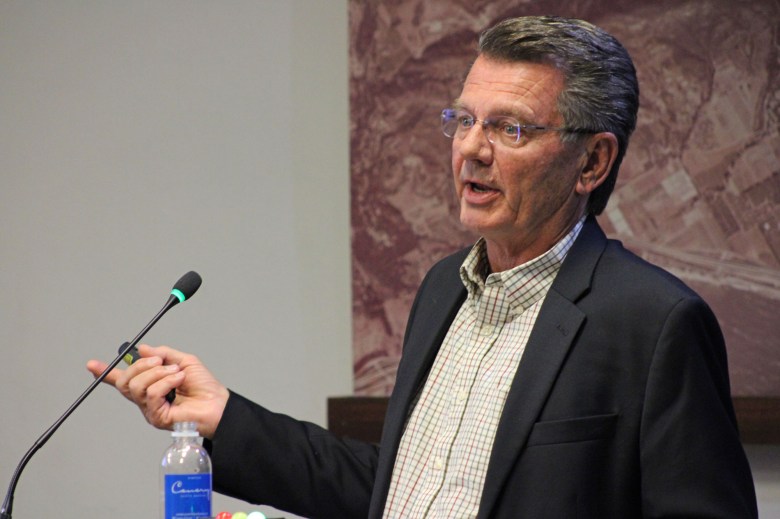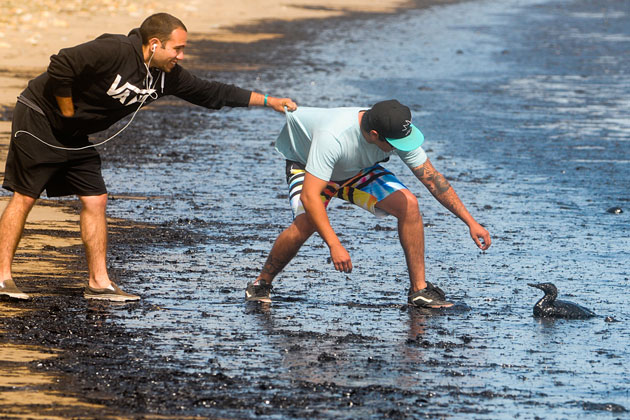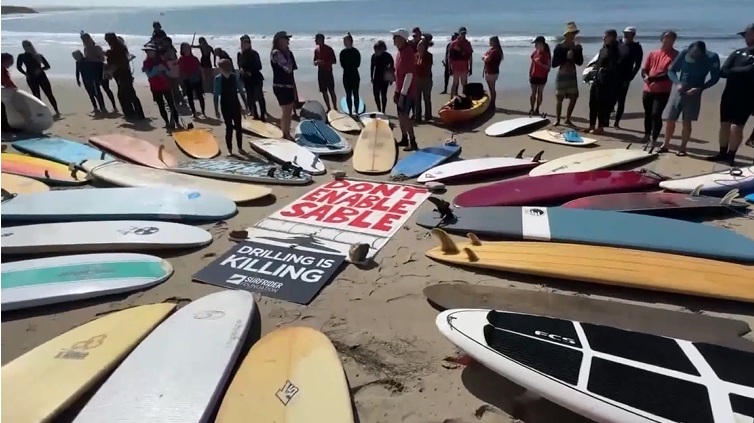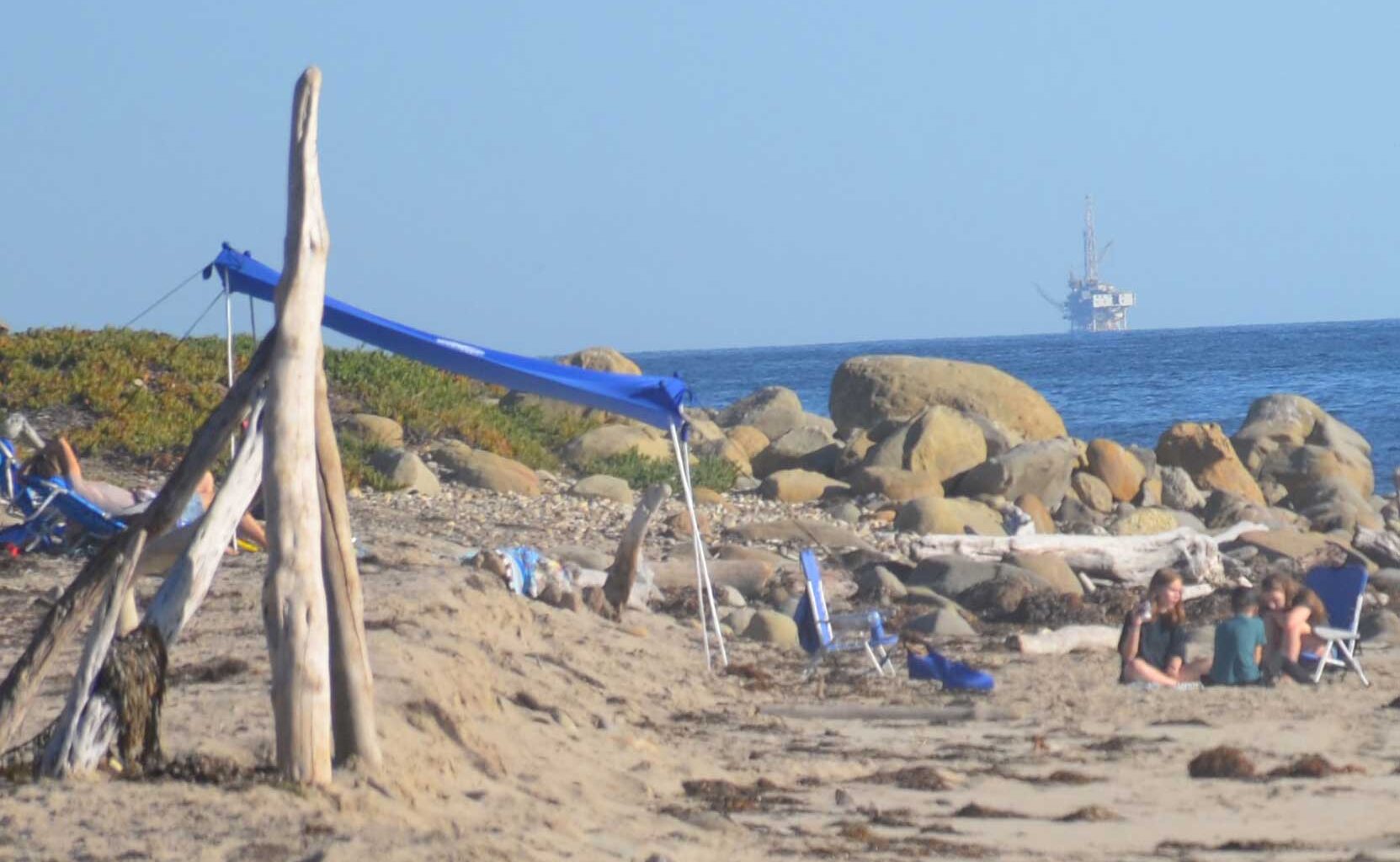Sable Offshore Corp. announced that it resumed oil production at Platform Harmony on Monday, the 10th anniversary of the Refugio oil spill that dumped 120,000 gallons of oil along the Gaviota coastline.
The company said in a statement that it restarted oil production from six wells of the offshore platform on Friday, at a rate of 6,000 barrels per day, and is transporting that oil to the Las Flores Canyon processing facility.
Three offshore oil platforms, a processing facility and an onshore pipeline in Santa Barbara County have been shut down since the pipeline ruptured on May 19, 2015, causing the oil spill.
Sable, which took over the Santa Ynez Unit assets in 2024, has been working to get approvals and restart production.
Sable said in a statement that the company has tested about 30% of the 32 wells on Platform Harmony and they are “performing consistently stronger” than they did when the platform was shut down in 2015.
The company said it expects to begin production at Platform Heritage and Platform Hondo in July and August.
“Sable expects to fill the ~540,000 barrels of crude oil storage capacity at (Las Flores Canyon) by the middle of June 2025 and subsequently recommence oil sales in July 2025,” the company said in a statement.
 Steve Rusch, Sable’s vice president of Environmental & Regulatory Affairs, addressed the Santa Barbara Planning Commission in October 2024 and answered questions about plans to prevent oil spills. Credit: Daniel Green / Noozhawk photo
Steve Rusch, Sable’s vice president of Environmental & Regulatory Affairs, addressed the Santa Barbara Planning Commission in October 2024 and answered questions about plans to prevent oil spills. Credit: Daniel Green / Noozhawk photo
As to the contested onshore pipeline, Sable said most sections have been hydrotested.
“Sable will complete the final hydrotest in order to meet the final operational condition to restart the onshore pipeline as outlined in the Consent Decree,” the company said. It also claimed it finished pipeline repairs in Gaviota State Park as of Sunday, which completes its required anomaly repair program.
The Office of the State Fire Marshal, which oversees oil pipelines in the state, said the Santa Ynez Unit segment restarted last week is related to an offshore facility and does not fall under its jurisdiction.
For segments that do fall under the office’s authority, Sable still needs to meet certain conditions, such as repair work, hydrotesting of the lines, and submitting a pipeline startup plan for the OSFM to review and approve, staff said Monday.
Pipeline and Restart History
 Two men rescue an oil-soaked sea bird at Refugio State Beach following the rupture of a nearby Plains All-American pipeline on May 19, 2015. Credit: Noozhawk file photo
Two men rescue an oil-soaked sea bird at Refugio State Beach following the rupture of a nearby Plains All-American pipeline on May 19, 2015. Credit: Noozhawk file photoAt the time of the Refugio oil spill, the onshore oil transportation pipeline was owned by Plains All American Pipeline, which was found guilty of failing to maintain it and fined $3.3 million in a criminal case. That company also paid hundreds of millions of dollars in civil settlements related to damages, lost income and other issues related to the oil spill.
Plains All American later sold the pipeline and other facilities to ExxonMobil, which transferred them to Sable in 2024.
Sable has since worked to restart oil production at the facilities and has recently clashed with the California Coastal Commission over work on the pipeline along the Gaviota Coast.
In April, the commission fined Sable $18 million because the company continued work on the pipeline despite multiple stop work orders. The company contends that the permits it obtained in the sale give it the right to conduct maintenance.
Sable has sued the Coastal Commission over the enforcement orders and Santa Barbara County over local permits.
Reaction to the Restart
Santa Barbara County declined to comment in response to Sable’s restart announcement Monday.
Coastal Commission Executive Director Kate Huckelbridge said in a statement: “The Coastal Commission is profoundly disappointed that Sable has refused to follow state law in its ongoing efforts to restart offshore oil production in Santa Barbara. Our agency continues to coordinate closely with the state Attorney General to determine the appropriate next steps.”
Multiple environmental groups have opposed Sable restarting oil production in southern Santa Barbara County.
“The fact that Sable is announcing the restart of production on the 10th anniversary of the Refugio oil spill that devastated 150 miles of coastline shows how little regard the company has for the people and environment of California,” Alex Katz, executive director of the Environmental Defense Center, said in a statement Monday. “EDC, our clients and partners are fighting from every angle to prevent the failed pipeline from ever restarting. Yesterday’s community gathering demonstrated that we stand united in protecting our coast from another devastating oil spill.”
On Sunday, several dozen people gathered at Refugio State Beach for a paddle-out to mark the 10th anniversary of the oil spill.
 A paddle-out Sunday marks the 10th anniversary of the Refugio oil spill in southern Santa Barbara County. Credit: KEYT.com photo
A paddle-out Sunday marks the 10th anniversary of the Refugio oil spill in southern Santa Barbara County. Credit: KEYT.com photo
“For those of us who lived through the destruction of the 2015 spill, it’s heartbreaking to watch Sable defy state orders and recklessly pursue the restart of the Plains Pipeline,” said Maureen Ellenberger, chair of the Sierra Club’s Santa Barbara-Ventura Chapter. “But unlike 2015, we now have a deep bench of environmental and community leaders working together, determined to stop Sable and prevent history from repeating itself. The paddle out is a powerful reminder of how far we’ve come.”
Other groups called for state agencies to stop Sable from restarting the pipeline.
“Announcing a restart 10 years to the day since this pipeline system smothered the coast in crude is a slap in the face to Californians who don’t want oil-coated pelicans and poisoned dolphins washing ashore again,” said Miyoko Sakashita, oceans director at the Center for Biological Diversity. “It’s alarming that no agency comprehensively looked at the environmental risks of restarting this aging, corroded pipeline, and that Sable steamrolled over orders to halt construction. We’ll keep working to protect the sensitive habitats, species and communities harmed by offshore oil drilling.”
Related Stories
